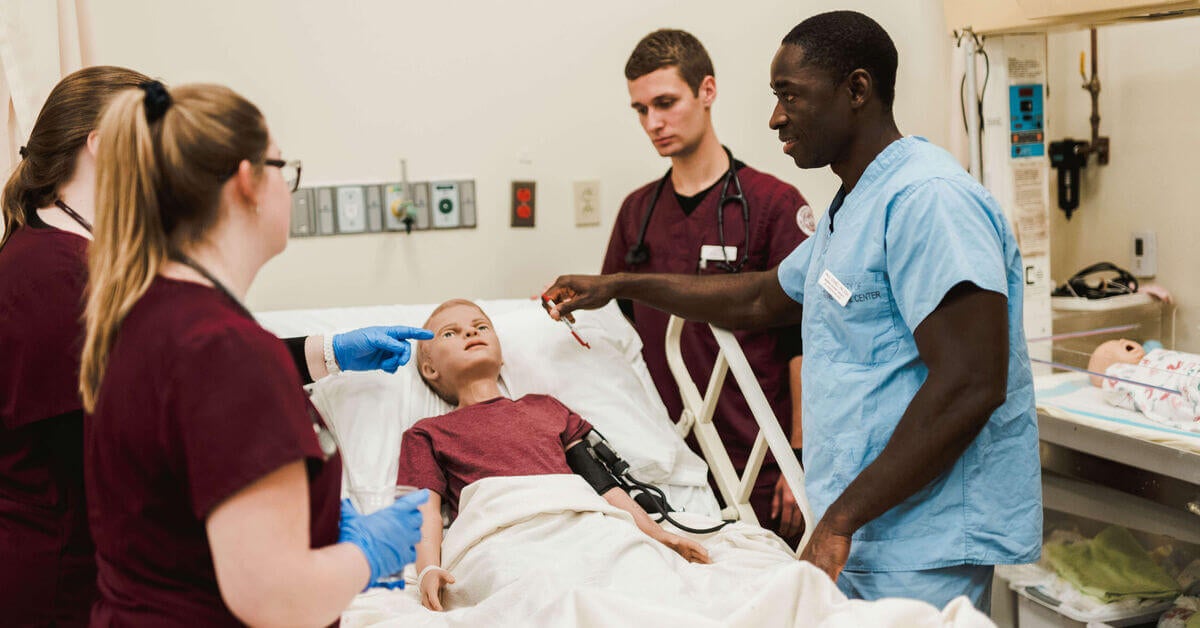How Do ABSN Graduates Compare to BSN Graduates?
The need for more nurses is increasing rapidly. As the baby boomer generation grows older, nursing professionals are needed to fill the roles left behind by retirees and to care for an aging population.The Bureau of Labor Statistics projects that there will be around 203,200 openings for registered nurses between 2021 and 2031. Not only that, but U.S. News & World Report ranks "registered nurse" at number eight in Best Health Care Jobs and number 17 in 100 Best Jobs overall.
Nursing is a profession known for its job security, steady salaries, and sense of meaningful work. Individuals who want to pursue a purposeful career that helps others and addresses the healthcare provider shortage may wonder if a Bachelor of Science in Nursing (BSN) or Accelerated Bachelor of Science in Nursing (ABSN) is the right fit for them.
Aspiring nurses will want to consider prior education, professional experience, and career goals when considering ABSN vs BSN.
Is an ABSN or BSN the Right Choice?
When it comes to ABSN vs BSN, the right answer for each individual depends on a few key factors, primarily past education.
Traditional Bachelor of Science in Nursing programs are designed for aspiring nurses who have not previously earned a bachelor’s degree. In other words, individuals who hold a high school diploma are eligible to apply for a traditional Bachelor of Science in Nursing degree program.
Accelerated Bachelor of Science in Nursing programs are designed for aspiring nurses who have already completed a bachelor’s degree in a field other than nursing. Since graduates of other bachelor’s degree programs have already completed the general education requirements for all bachelor’s degrees, an ABSN program leverages those completed credits to empower students to complete their nursing degrees more efficiently.
Benefits of an ABSN Program
While both ABSN and BSN programs are designed to equip students with a bachelor of science in nursing degree, the time spent in the respective programs can look quite different in terms of program length, time spent on coursework per week, and student experience. Consider some of the ABSN vs. BSN differences.
ABSN Degree Programs Take Less Time
One of the primary benefits of an ABSN program is the shorter program length than the time required to earn a BSN degree. A traditional BSN program includes at least 120 credit hours, which take four years to earn if following a typical, full-time student schedule. An ABSN, on the other hand, typically includes around 60 credit hours.
ABSN programs are designed to be completed quickly. They feature shorter breaks between courses than the traditional semester schedule, which not only helps aspiring nurses reach their goals more quickly but also reduces learning loss. Studies have shown that longer gaps between courses can lead to lower grades and increased knowledge decay. As intensive, full-time programs, ABSN programs resist learning loss and help students to maintain and grow their understanding of critical nursing topics.
It is important to note that the quick pace of an ABSN program typically means that students will not be able to work while in school. The hours required each week and the rigor of the coursework tend to require the majority of the student’s time and focus. That said, for those who are able to commit just four semesters to earn their degree, the accelerated approach can lead to a career as a nurse quickly.
ABSN Programs Strategically Structure Coursework for Nursing Education
Since ABSN students have already completed their general education requirements, ABSN programs can offer specialized courses that speak directly to nurses’ clinical experience. The accelerated approach also means that students have clinical experiences much sooner than they would in a traditional BSN program. The ABSN curriculum, program structure, and clinical placements are designed to equip graduates to pass the NCLEX licensure examination and begin practicing as RNs.
ABSN Programs Leverage Prior Academic and Professional Experience
ABSN students benefit from their prior collegiate experience acquired during their time spent in their first bachelor’s degree program. From study skills and time management techniques to career achievements, ABSN students are already accustomed to the rhythm of collegiate learning, which empowers them to focus on their nursing studies.
Prior professional experiences can enhance ABSN student perspectives as well. Former teachers, for example, may find themselves especially interested in the nurse education roles they could pursue with an ABSN. An ABSN student who previously earned a bachelor’s degree in biology may have worked as a research assistant in a laboratory, growing their scientific knowledge in their daily work. Or a chemistry graduate may have had a career as a pharmaceutical representative, developing an understanding of various medical treatments, which will enhance their future nursing practice.
The Importance of Bachelor’s-Prepared Nurses
While returning to school for a second bachelor’s degree may seem like an overwhelming idea at first, an accelerated BSN program drastically reduces the amount of time students will need to spend preparing for a nursing career. While programs such as an Associate Degree of Nursing (ADN) may seem appealing due to the smaller course load, such a degree limits nurses when it comes to what roles they can achieve, their earning potential, and their impact on patients.
The American Association of Colleges of Nursing encourages BSN preparation as the degree programs equip nurses who are “prized for their skills in critical thinking, leadership, case management, and health promotion, and for their ability to practice across a variety of inpatient and outpatient settings.”
BSN programs teach leadership skills and management techniques. They also prepare nurses to understand health policy and research-based practice in ways that better equip them for future leadership roles.
Some hospitals and health systems require a BSN for the nurses who work in their facilities. Consider some additional examples of nursing employers who strongly prefer or require nurses to have a Bachelor of Science in Nursing degree:
- The U.S. Air Force, Navy, and Army require active duty nurses to have a BSN
- The Veterans Health Administration requires a BSN for all nurses beyond entry-level positions.
- The American Association of Colleges of Nursing found that 40.6% of employers require new nurses to have a BSN degree, and 77.4% prefer that they do.
Studies have shown that BSN-prepared nurses make a positive difference in improving patient outcomes. Here are just a few of many examples highlighting the importance of BSN programs when it comes to patient clinical care:
- Patients who experienced in-hospital cardiac arrest had greater odds of surviving to discharge with good cerebral performance when cared for by nurses who had a Bachelor of Science in Nursing and lower workloads.
- A ten-point increase in a hospital’s percentage of nurses with BSNs was associated with an average reduction of 2.12 deaths for every 1,000 patients, and a reduction of 7.47 deaths per 1,000 patients for a subset of patients with complications, following surgeries.
- Hospitals with a higher percentage of RNs with baccalaureate or higher degrees had lower congestive heart failure mortality, decubitus ulcers, failure to rescue, and postoperative deep vein thrombosis.
From greater access to leadership roles to improved patient outcomes, the reasons to earn an Accelerated Bachelor of Science in Nursing are many.
Earn your BSN with Saint Joseph College of Maine’s Hybrid ABSN
Do you want to help address the healthcare provider shortage? Are you ready for a career change or interested in leveraging your existing bachelor’s degree to give you insight and skills in the field of nursing? If you have a bachelor’s degree in a non-nursing subject, the Hybrid Accelerated Bachelor of Science in Nursing at Saint Joseph’s College (SJC) of Maine could be the ideal next step for you.
The Saint Joseph College of Maine’s ABSN is a hybrid, full-time program that features 100% online coursework. A 15-month program that takes just four semesters, the ABSN includes 60 credit hours in topics such as health assessment, evidence-based practice, and nursing care of children.
Students can expect to spend somewhere between 48–60 hours per week on the program, including approximately:
- 4–8 hours a week in synchronous courses, which are scheduled, real-time virtual classrooms with live instructors.
- 12–16 hours in self-paced, independent online coursework.
- 20–24 hours completing assessed activities such as discussions, assignments, projects, and studying for tests
- 12 hours in on-site clinical placement hours with a preceptor
The program also features two on-campus immersions in the first and third semesters. These immersions include hands-on skills training and simulations in the SJC Center for Nursing Innovation. When it comes to clinical placement, the SJC clinical placement team works closely with each student to ensure that rotations meet all of the necessary guidelines.
Graduates of the Saint Joseph College of Maine’s BSN programs have a first-time NCLEX-RN passing rate of over 90%. The CCNE-Accredited ABSN program is taught by active clinicians who bring real-world experience into the online classroom. The program is authorized for individuals living in Maine, Massachusetts, New Hampshire, and Vermont.



